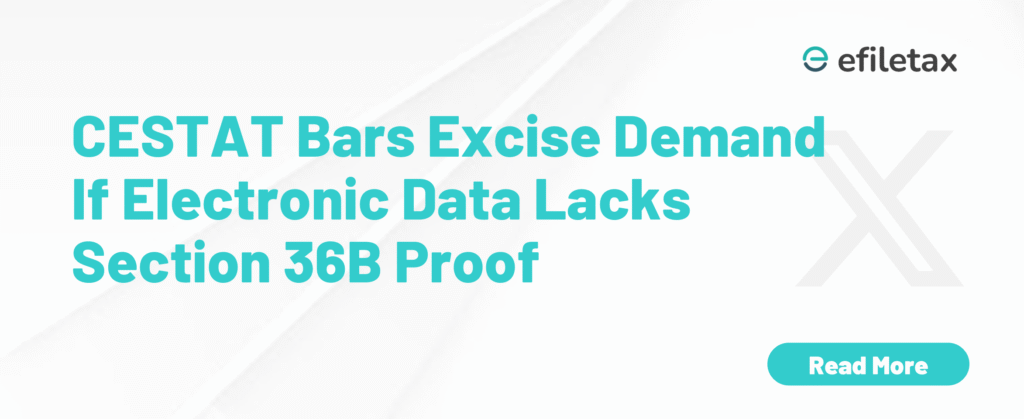
Electronic Data Without Section 36B Not Valid for Excise Demand
In a recent case, the Customs, Excise and Service Tax Appellate Tribunal (CESTAT) clarified that electronic data without Section 36B certification and statements recorded without complying with Section 9D of the Central Excise Act, 1944 cannot be used as the sole basis for raising an excise duty demand. This decision reinforces long-standing principles of natural justice and evidentiary law under tax proceedings.
What is Section 36B of the Central Excise Act?
Section 36B governs the admissibility of computer-generated documents in excise proceedings.
Without this certification, any data taken from laptops, Excel files, or accounting software has no evidentiary value.
What Does Section 9D Require?
Section 9D relates to statements recorded during investigations, such as under summons by excise officers.
To use these statements in a show-cause notice or adjudication:
Failure to comply with these conditions violates the right to cross-examination, rendering the statement legally inadmissible.
CESTAT Ruling: Why It Matters
In this case (refer: XYZ Pvt Ltd vs. CCE, 2025-TIOL-CESTAT), the excise department issued a demand relying heavily on:
- Excel files found during investigation
- Statements of employees under Section 14 of the Central Excise Act
However, the department did not produce a Section 36B certificate and failed to follow Section 9D procedures.
CESTAT held:
- The demand was unsustainable in law.
- Reliance on uncertified digital evidence and untested statements violated principles of natural justice.
- The burden of proof lies with the department to follow due process before alleging evasion.
Practical Impact for Businesses
If your business is facing excise duty demand based on:
- Pen drive or computer data without certification
- Statements from staff recorded without cross-examination opportunity
You may challenge it by citing this CESTAT ruling and demand strict compliance with Section 36B and Section 9D.
Expert Tip
Always ask for:
- The source and certification of digital data used in the case
These lapses can help invalidate entire proceedings.
Legal References
- Central Excise Act, 1944 – Section 36B
- Indian Evidence Act – Section 65B
- CBEC Circular No. 1003/10/2015-CX dated 05.05.2015 (reiterates need for compliance with Section 9D)
Summary
CESTAT rules that excise demands based solely on uncertified electronic data (without Section 36B compliance) and untested statements (without Section 9D adherence) are invalid.
FAQs
Q1. Can Excel data from a seized laptop be used in excise cases?
Only if certified under Section 36B and supported by Section 65B certificate.
Q2. What if the person who gave the statement is not cross-examined?
The statement becomes inadmissible unless reasons are recorded under Section 9D(1).
Q3. Does this apply to GST proceedings too?
While this ruling is under Central Excise, similar evidentiary standards apply in GST under Section 164 and Evidence Act principles.
Need help fighting an excise or GST demand notice?
Let Efiletax assist with expert legal support, documentation review, and tribunal appeal filing.
👉 Contact us now for a free consultation.